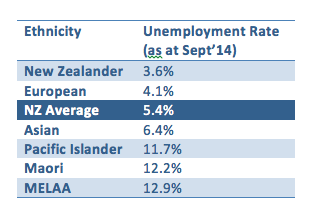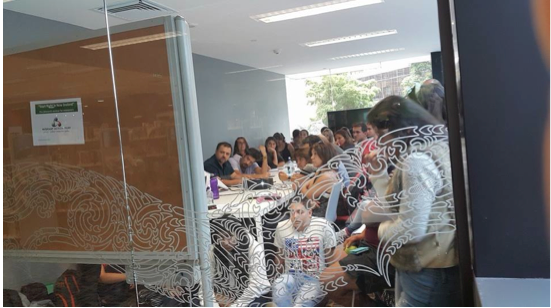We’ve just come to the end of March, a month full of events about multiculturalism, race relations and ending racial discrimination. However making multiculturalism work is about more than just “the level of ‘warmth’” felt towards people from other countries. It’s fundamentally about sharing of power, wealth, and decision-making. It’s about self-determination. It’s about equal opportunity in the system which we live by. Something aptly captured by the series of videos “I too am Auckland”. Unless… what you mean by “multiculturalism” is window-dressing. Decorating your city with colourful events and coloured people, photo ops for politicians, providing “positive and joyful experiences” for New Zealanders (aka Pakeha?), swapping recipes via the Human Rights Commission (not a joke), oh, and spending a lot of time talking about multiculturalism.
Let me tell you right now, what migrant and ethnic people need is equality of opportunity. Especially in the job market. Fairer visa terms and less racism. When a person can support him or herself economically they can also solve most of their other problems. So is swapping recipes and dressing up in our traditional clothes, singing, dancing and cooking for the dominant culture making any difference?
Not really. Did you know unemployment is not just one rate, 5.4%. It is actually a spectrum demarcated by race and gender. This table below shows the limits of current Statistics NZ practice – only one variable. Race AND gender is not readily available on stats.govt.nz (everything should be gender disaggregated, it’s not 1960). Also “Asian” needs to be broken down why do we lump 60% of the world’s population into one heading?
So we can see most ethnic groups have 2-3 times the unemployment of Pakeha and the NZ average. These groups are also typically more vulnerable when the economy is down, for example in the Global Financal Crisis (2008-2010) Pacific Peoples experienced 5% job losses, whereas the NZ average job losses was just 1.9%, in particular because Pacific Islanders are over represented in low paid low skill work. Similarly Pacific peoples’ weekly incomes haven’t keep up with the NZ average: 2007-2012 the average weekly NZ income increased $54 to $721 while for Pacific people this average increased by just $2—shifting from $477 to $479! This gives all the more reason for cultural events to provide work opportunities for people of that community, right?
Another thing to take into account is that the Household Labour Force Survey unemployment statistics only measure people with NZ residency. Not on precarious work permits, working holiday visas or international students.
This is a picture of Migrant Action Trust’s job search seminar for Spanish speakers last week, usually 10 or so people turn up, now burgeoning to 40+, it’s hard to know the situation for people on vulnerable work visas because they are not measured in Household Labour Force Survey.
Back to race relations month – what we need is a fair go in the job market, but what’s being created are race relations events and talk fests. Again, when we look closely at the events and talk fests – ethnic people aren’t get a fair go even in the organising. There should be more questioning and examination of this exploitative nexus between culture and identity and neoliberalism. It’s a money spinner, gravy train, and ticket into parliament for some, while ethnic people have 2-3 times the national unemployment rate.
There are multimillion dollar manifestations of neoliberalism-culture nexus at the hands of Auckland City Council CCO ATEED. Under the super-city Council structure, huge public cultural festivals like Diwali, Pasifika and Chinese Lantern Festival, are run by ATEED with the help of an ethnic advisory panel and a partner like the Asia New Zealand Foundation. They are not community led events. Given the exclusive (not participatory, not inclusive) nature of this process, the recent claims of tokenism of the Ethnic Peoples’ Advisory Panel, plus the resignation of two members including the chair – can this approach really “ensure the authenticity of the festival is maintained”? And, more importantly: by whose measure? Are these events controlled by pakeha for the entertainment of pakeha at the expense of ethnic people?
If we examine the Pasifika festival more closely, this year, presumably, to ensure the event is fit for consumption, it was polished up by contracted consultant organisation Orange Productions, who of course profited from the contract. The substance of the event is supplied by ethnic people, who of course, do not profit from their performance. To sell their own food at the event, Pacific people have to pay for a stall. We’re not talking $30, but $350 to $420, for a stall! (or $2,000 to $5,500 for an information stall). It has also been noted that the unpaid time taken to train and perform for the event takes a toll on the performers, especially as it can affect academic performance of school children. Some Pacific elders even advocated boycotting Pasifika this year because of concerns that ATEED is “focusing only on its monetary return on the event rather than delivering…[a] community based Pasifika festival”.
So, why is public money going into an event, where members of the public are volunteering the content, time, talent, culture, and identity while a private company contractor is making a profit from doing the organising? Why not let the value of organising and managing the event also go back into the community it belongs to?
Have a look at the diversity of the people in the partner organisations:
Asia New Zealand Foundation – worked with ATEED on the Lantern Festival & Diwali
Orange – worked with ATEED on Pasifika
ATEED said to contract festivals out is “proper process”, let’s have a look at their diversity. And ATEED is supposedly accountable to Auckland Council governing body, let’s have a look at their diversity. Or the Auckland Council Executive team that oversees implementation.
By way of a quick glance at names and skin tones, you can see that these decision-makers are not representative of Auckland’s actual demographics: 20% of Auckland is “Asian” (approx 10% is Indian), 14% is Pasifika, 10% is Maori. We don’t see these proportions represented at decision-making level, rather these structures are a litmus test of the real racial privilege and prejudice in New Zealand. Let alone the intersectionality of race and gender faced by migrant and ethnic women.
There is a reason why every year we talk about the same problems. No matter how many ethnic festivals you go to, how warm you feel towards other cultures, unless there is genuine power sharing and more diversity of decision-makers, things will stay the same. If NZ can’t even support power-sharing with Tangata Whenua what hope is there for migrants? …So, what can you do? Learn more about the true histories of peoples and places, especially in NZ. Recognise your own privilege as much as you can, whether it is race, class or gender. Examine honestly whether you are sharing power or accumulating power and privilege for yourself. Do what you can to support others to participate, including stepping aside to make space, and of course adjusting the rules of the game to be more inclusive.
Roshni Sami, BA/BCom, MA, Auckland, New Zealand. — Roshni Sami is an activist, researcher and project manager. She is of Pakeha and Fiji-Indian heritage. She returned to Fiji to after grad school and worked for six years in the Pacific doing work for development agencies such as UNWOMEN, AusAID and other not-for-profits organisations including running the Pacific Network on Globalisation a trade policy watch-dog. Disillusioned by what she saw in the development sector, she returned to New Zealand in 2011 and worked in property for three years, before supporting the Internet MANA campaign in the 2014 election. She is currently volunteering with Migrant Action Trust in Auckland.







The cost of stalls at the Pacifica was prohibitive, where did the fees go?
Migrants and refugees want their communities to be involved in cultural festivals but the cost of costumes, practices, time off work and making traditional foods is very expensive
Cultural festivals are only one way of celebrating diversity.
To me, true diversity is when we give refugees and migrants a chance, we do not tell them the job is taken when they apply, when it is not, we do not tell them the house is taken, when it is not and they are turned away because of their colour, we give them a fair chance.
Cultural diversity is not only about getting dressed in colourful dress for people to take photos, it is about welcoming migrants and refugees into our communities and about being inclusive and working with not for them.
It is not one day in the year, cultural diversity is every day of the year.
And yet we have had the left unite to elect a nationalistic anti-immigration politician who uses racism to gain support.
Go figure.
The problem I’ve found with immigrants is that they can be annoyingly interesting , infuriatingly friendly , disturbingly good cooks using hideously delicious ingredients and don’t get me started on their music . The men are often handsome fellows, brown skinned and charming , the women beautiful , elegant and quick with a smile .
No need for any of them immigrants here . Not in NZ Mate .
i don’t believe we should be the slightest bit interested in diversity, only in competence. We should elect the best leaders, irrespective of race or gender, and hold them accountable. It seems to as though opinion pieces like this are little more than a call for mediocrity, for style over substance.
Nehemia/Intrinsicvalue; Only because it suits you that the leaders elected are white and male.
People from different cultures make the world a more interesting place. If you look at them in such a narrow way then you are missing a great deal. If you prefer to hide in the shadows and miss out on what people of different cultures have to offer that is your choice, but it won’t be mine.
It is true. Personally I need free english courses to later study a qualification.
I cant get student allowances while studying english. I know there are very basic and intermediate free PART TIME english courses (like 4 hours per week). However full time quality courses are really expensive.
I have been in benefit for some years because I cant find a job.
Comments are closed.